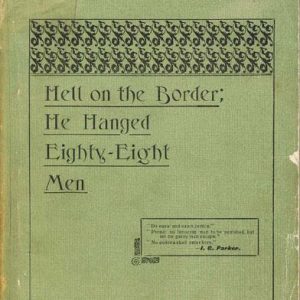calsfoundation@cals.org
Hell on the Border
The book Hell on the Border: He Hanged Eighty-Eight Men by S. W. Harman was published in 1898. It gives a history of the United States District Court for the Western District of Arkansas, located in Fort Smith (Sebastian County), and focuses primarily on the tenure of Judge Isaac C. Parker. It is considered one of the most important sources in telling the history of Judge Parker’s court and the formation of the early district court in this area.
The United States District Court for the Western District of Arkansas was created on March 3, 1851, and originally centered in Van Buren (Crawford County). In addition to Arkansas, the district also included the Indian Territory (present-day Oklahoma). On March 3, 1871, the court moved from Van Buren to Fort Smith. In March 1875, after the resignation of Judge William Storey, President Ulysses S. Grant appointed Isaac C. Parker to the bench. Parker was a congressman from Missouri and a supporter of Native American rights. He served as a judge from 1875 to 1896. During his tenure, he tried 13,490 cases. He sentenced 160 men and women to death, of whom seventy-nine were actually hanged.
Samuel W. Harman was a hotelier from Bentonville (Benton County). He served on several juries in Fort Smith and, as a result, became acquainted with Parker. Although Harman is the only author credited for the work, two other people were involved in its creation. J. Warren Reed was a Fort Smith defense attorney who argued in Parker’s court. Reed financed the book and wrote some portions of it, most notably Chapter 33, titled, “Some Noted Cases in Which J. Warren Figured as Attorney for Defense.” C. P. Sterns is named as the compiler of the book but may have also helped Harman with his research, particularly with judicial records. In addition, six poems written by Sterns are included in the book.
Hell on the Border: He Hanged Eighty-Eight Men was published in 1898 by the Phoenix Publishing Company in Fort Smith, of which Harman was president of the board of directors. The book had forty-two chapters covering 720 pages and sold for $2.00. Harman dedicated the book to Parker, calling him “one of the noblest men, whose keen sense of justice, made him a rigid disciplinarian and a stickler for right, yet left him a devoted lover of humanity and in full sympathy with its sorrows.” One of the first books published on the history of the district court, it gave a history of the United States District Court for the Western District of Arkansas from its creation in 1851, through the tenure of Parker, and up to 1896, when Congress separated the Indian Territory from the court’s jurisdiction.
The book begins by explaining the laws that created the Western District. It gives short biographies of those associated with the court and outlines the careers of famous outlaws such as Belle Starr, Cherokee Bill, Bill Cook, and the Dalton gang, all of whom were tried in Parker’s courtroom, and describes some of their crimes. In addition, the book includes the trial record of Reed, Parker’s instructions to juries, illustrations of members of the court and criminals, and a discussion of the legislation that ended the court’s jurisdiction in the Indian Territory.
There are some inaccuracies in the text—most notably the title of book, which asserts that Parker “hanged eighty-eight men.” According to historian Glenn Shirley, this list includes all those who were hanged during the time the court was in Fort Smith, which was from 1871 to 1896. Judge Parker presided for a shorter time, from 1875 to 1896. During Parker’s time, there were seventy-nine men who hanged.
At the time of its first appearance, the book failed to reach a wide audience, as $2.00 was deemed excessive. However, later editions proved more successful. In 1930, J. W. Rice, a newspaperman from Oklahoma, published a 320-page abridgement of the book that focused on Parker’s tenure. In 1953, Frank L. Von Easton issued a shorter volume of 303 pages. In 1971, Jack Gregory and Rennard Strickland published a version known as the “Indian Heritage Edition” that was 214 pages. In 1954, the Frontier Press of Texas published two sections from the book and titled them Belle Starr, the Female Desperado and Cherokee Bill: The Oklahoma Outlaw. In 1992, the University of Nebraska published the first reprinting of the original text, with an introduction by Larry D. Bell, a history professor from Arkansas State University in Jonesboro (Craighead County).
For additional information:
Ball, Larry D. “Before the Hanging Judge: The Origins of the United States District Court for the Western District of Arkansas.” Arkansas Historical Quarterly 49 (Autumn 1990): 199–213.
Harman, S. W. Hell on the Border: He Hanged Eighty-Eight Men. Reprint edition of 1898 original. Lincoln: University of Nebraska Press, 1992.
Kimberly R. Rush
Little Rock, Arkansas


 Hell on The Border
Hell on The Border 



Comments
No comments on this entry yet.